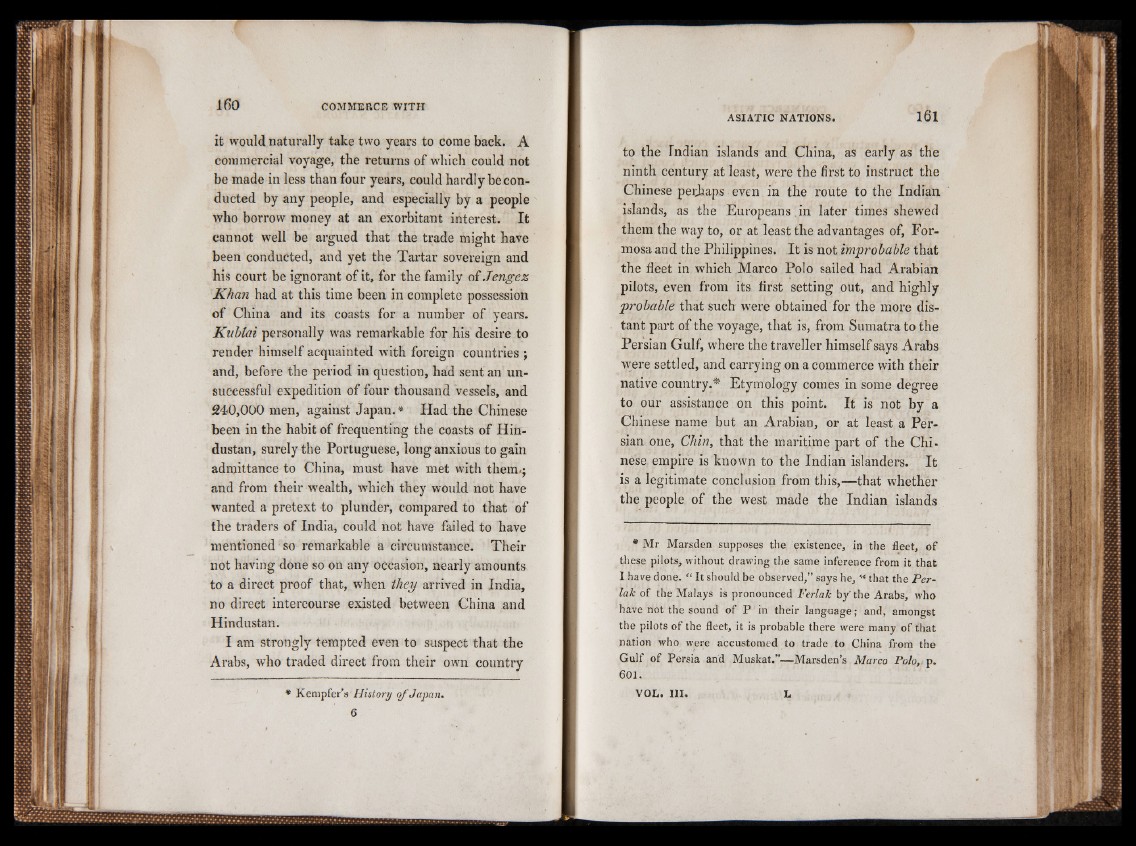
it would naturally take two years to come back. A
commercial voyage, the returns of which could not
be made in less than four years, could hardly be conducted
by any people, and especially by a people
who borrow money at an exorbitant interest. It
cannot well be argued that the trade might have
been conducted, and yet the Tartar sovereign and
his court be ignorant of it, for the family of Jengez
Khan had at this time been in complete possession
of China and its coasts for a number of years.
Kuhlai personally was remarkable for his desire to
render himself acquainted with foreign countries ;
and, before the period in question, had sent an unsuccessful
expedition of four thousand vessels, and
240,000 men, against Japan. * Had the Chinese
been in the habit of frequenting the coasts of Hindustan,
surely the Portuguese, long anxious to gain
admittance to China, must have met with them.;
and from their wealth, which they would not have
wanted a pretext to plunder, compared to that of
the traders of India, could not have failed to have
mentioned so remarkable a circumstance. Their
not having done so on any occasion, nearly amounts
to a direct proof that, when they arrived in India,
no direct intercourse existed between China and
Hindustan.
I am strongly tempted even to suspect that the
Arabs, who traded direct from their own country
* Kempfer ’a History o f Japan.
6
to the Indian islands and China, as early as the
ninth century at least, were the first to instruct the
Chinese perhaps even in the route to the Indian
islands, as the Europeans .in later times shewed
them the way to, or at least the advantages of, Formosa
and the Philippines. It is not improbable that
the fleet in which Marco Polo sailed had Arabian
pilots, even from its first setting out, and highly
probable that such were obtained for the more distant
part of the voyage, that is, from Sumatra to the
Persian Gulf, where the traveller himself says Arabs
were settled, and carrying on a commerce with their
native country.* Etymology comes in some degree
to our assistance on this point. It is not by a
Chinese name but an Arabian, or at least a Persian
one, Chin, that the maritime part of the Chinese
empire is known to the Indian islanders. It
is a legitimate conclusion from this,—that whether
the people of the west made the Indian islands
* Mr Marsden supposes the 'existence, in the fleet, of
these pilots, without drawing the same inference from it that
I have done. “ It should be observed,” says he, ** that the Per-
lalc of the Malays is pronounced Ferlak by the Arabs, who
have not the sound of P in their language; and, amongst
the pilots of the fleet, it is probable there were many of that
ration who were accustomed to trade to China from the
Gulf of Persia and Muskat.”—Marsden’s Marco Polo,, p.
601.
VOL. III. L